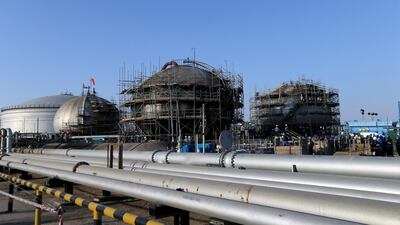Oil prices steadied after closing below two-month lows last week as markets remained hopeful of progress in resolving a long-running trade dispute between the US and China amid weakening global economic growth.
Brent was trading up 1 per cent at $58.96 per barrel at 3.05pm UAE time, while West Texas Intermediate, the benchmark tracking largely North American crude grades, was up 1.1 per cent at $53.43 per barrel.
A spate of gloomy economic data has dented confidence in the prospects for oil demand growth, which has depressed prices for much of the year.
"Following Saudi Arabia's stunning recovery from the largest oil supply disruption in history, the oil market has again refocused on the deceleration of the global economy. Global PMIs are already signalling contraction and negative data continues to roll in," Bank of America Merrill Lynch said in a note on Monday.
Slowing global economic growth has caused a contraction in oil demand, which averaged 720,000 barrels per day between the third quarter of 2018 and the second quarter of this year, considerably slower than the 1.4 million bpd trend between 2011 and 2018.
Demand growth from the Organisation for Economic Co-operation and Development (OECD) countries also shrunk to below 200,000 bpd year-on-year over the past year, BoAML said. The bank also said that non-OECD countries, led by China and India, performed somewhat better, averaging demand of 900,000 bpd over the same period.
Data for global manufacturing has also been downbeat, sinking for the fifth straight month in September, according to JP Morgan's Global Manufacturing Index. The index's gauge for employment and new orders contracted for the fifth consecutive month as slowing economies weighed on manufacturing growth.
US manufacturing also contracted, posting some of the weakest figures since the end of the last recession as trade tensions between the world's two largest economies — the US and China — affected the sector's growth.
Lack of momentum on resolving the dispute between the two nations will continue to depress global economic momentum, Abu Dhabi Commercial Bank said, stating that expectations of a breakthrough during talks scheduled for this week were low.
"We believe that it is too early to expect any trade deal between both countries, as this is the first high-level meeting since the early-August trade escalation," the lender said on Monday.
ADCB expected the US Federal Reserve to step in and cut interest rates further if incoming US data indicates a further slowdown in economic activity.


